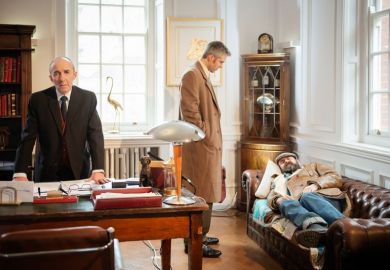There are experts on everything, and most of them are academics.
So, whenever there’s a film, play or television drama set in the past, someone will always pop up and gleefully point to some minor inaccuracy or anachronism. I ran into a guy at a party the other day who was pontificating about errors in 17th-century garden design and Victorian slang he’d recently noticed. Am I alone in finding this incredibly irritating?
I can see why a historian might think it genuinely important how a film represents Sylvia Pankhurst, Malcolm X or General de Gaulle. And, when the plot turns on ballet, boxing or chess, it obviously makes sense for directors to get the details right, if only because they can expect nerdily knowledgeable enthusiasts to come and see their movie. But what about minor background details that most people wouldn’t even notice?
I have never been sympathetic to the Daily Mail view of the world, that the main purpose and pleasure of life is finding things to be outraged about. If experts on ceramics, printing or jewellery go to a period film and are horrified to see a piece of crockery, a typeface on a poster or a brooch that wouldn’t have existed at the relevant time, I guess that is their right. But aren’t they spectacularly missing the point?
Accuracy about minutiae in a film often depends on extraneous practical and financial, not to mention artistic, factors.
I once interviewed the director Stephen Frears whose 2006 film The Queen won Helen Mirren an Oscar for best actress. Settings were chosen for particular scenes, he explained, not because the real Buckingham Palace has rooms of the same size and shape but solely to create the right atmosphere of intimacy or claustrophobia. Attempts to create authenticity can fall foul of a star’s intransigence (“All the extras looked exactly right, but Brad Pitt refused to have a haircut”).
Similar issues apply to films adapted from novels, as Philip Kemp argues in our Culture pages this week, in a review of Anne Fontaine’s new film Gemma Bovery where he also considers the challenges of turning much-loved classics into movies. While “lovers of a particular novel will often complain that a screen adaptation has traduced the book,” he points out, “sticking too closely to the original [can often] make for a stilted, over-literary film”. Dull fidelity is no more desirable in a movie than in a marriage.
And nor is the kind of dull accuracy some experts seem to want. Getting tiny details right in films, if a virtue at all, is about a million times less important than the things that really matter for conveying meaning and emotion, lighting, camera angles, editing and so on. Call me old-fashioned, but I go to the cinema for a few laughs and a few tears, cheerful escapism or gripping drama. The kind of patronizing pedantry one finds in some academics is only a way of depriving oneself of pleasure.
Read Philip Kemp's review of Gemma Bovery
Register to continue
Why register?
- Registration is free and only takes a moment
- Once registered, you can read 3 articles a month
- Sign up for our newsletter
Subscribe
Or subscribe for unlimited access to:
- Unlimited access to news, views, insights & reviews
- Digital editions
- Digital access to THE’s university and college rankings analysis
Already registered or a current subscriber?




